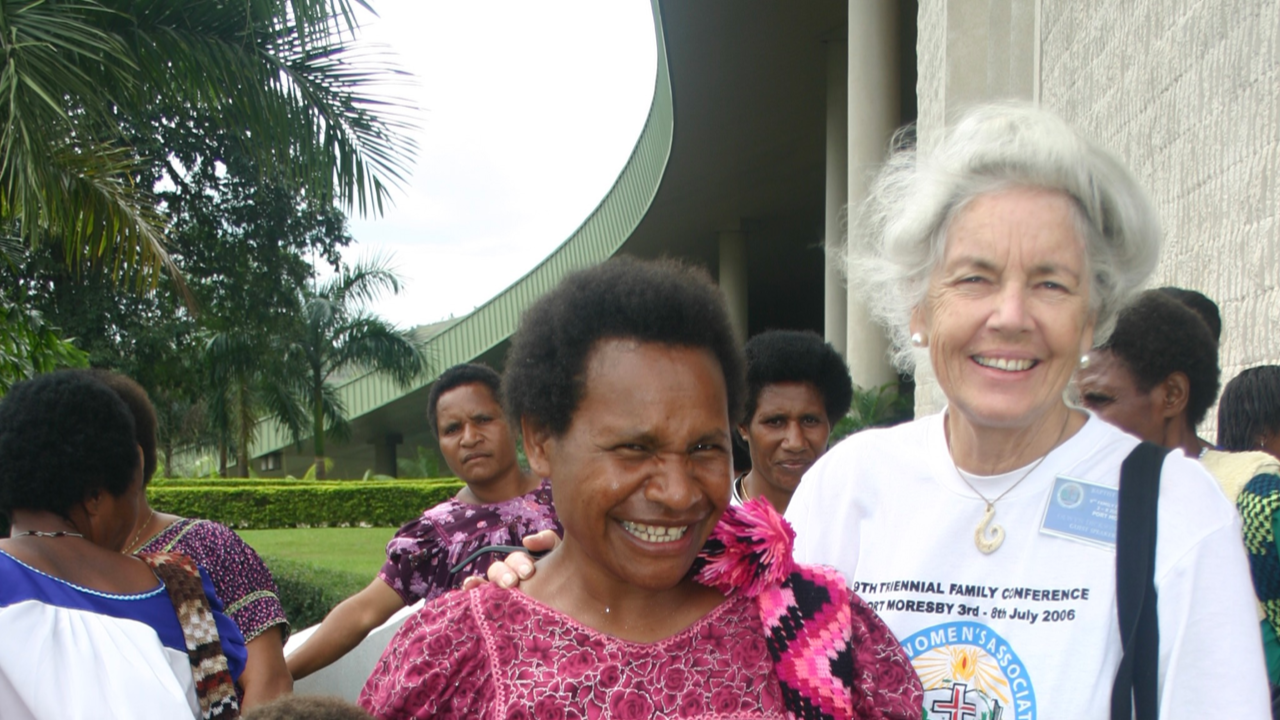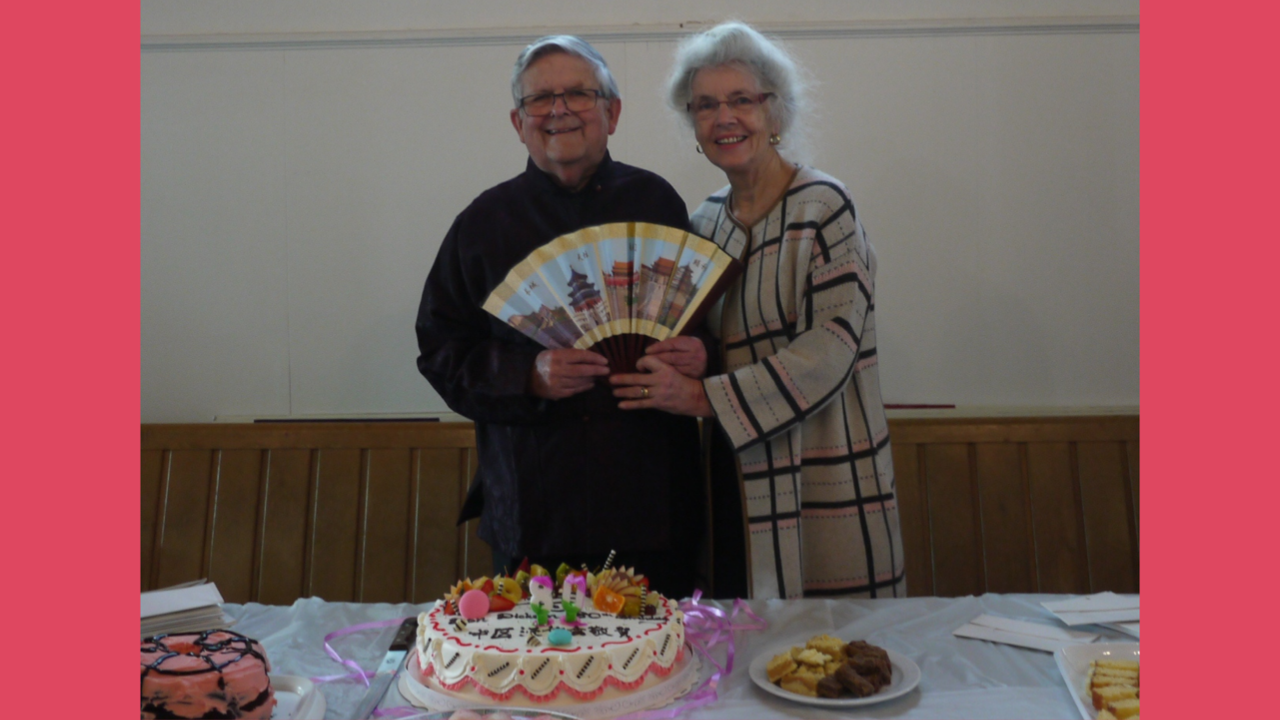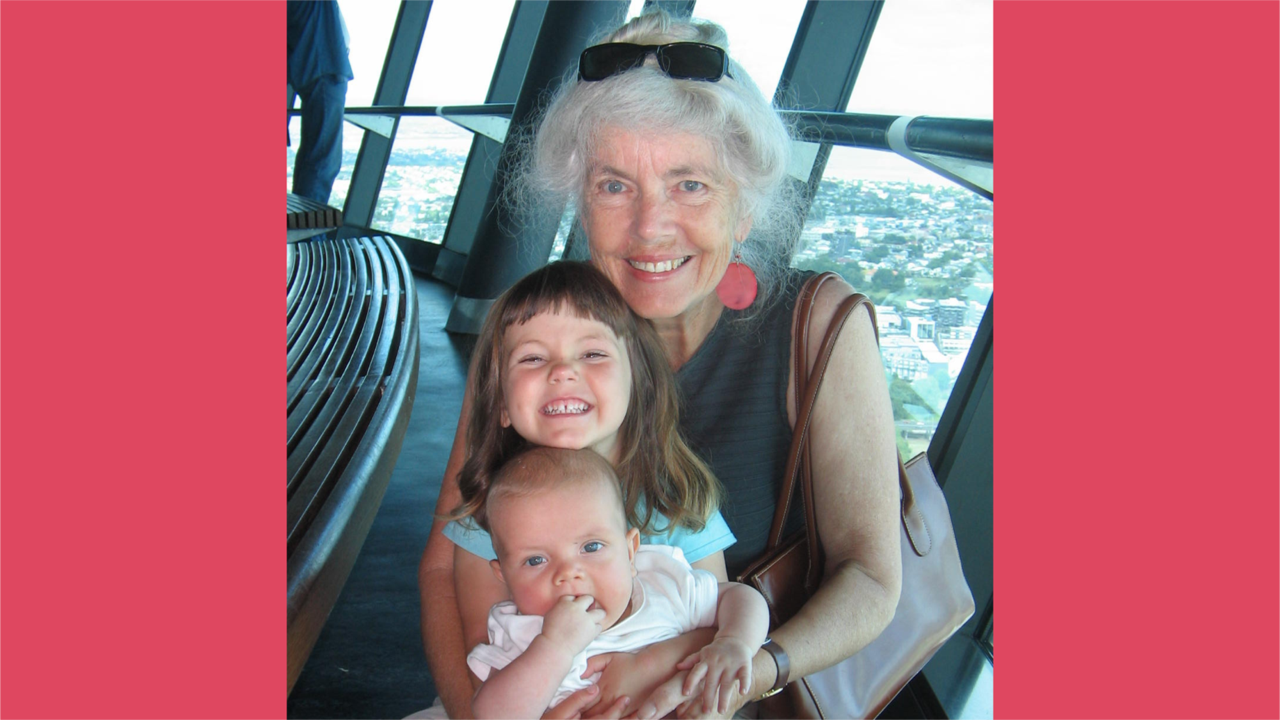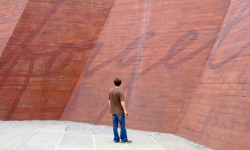
Married to a pastor and helping pastorally, Olwyn knew she also had her own role. Her creativity shone in designing celebrations and in the women’s organisations that were so active in the late 20th century. She excelled again in international women’s work with the Baptist World Alliance.
Change has been a constant in Olwyn’s life. She says God moves her on before she gets comfortable, so the text ‘Jesus Christ, the same yesterday, today and forever’ means much to her. With parents Royston and Anne Brown, NZBMS missionaries based in Bengal, Olwyn was born in India in 1940, followed by two brothers. In spite of limited finances, the family lived with interest and satisfaction in Madras, Bombay, Delhi and Agra during world War 11, following Major Brown’s career in the Indian army, on loan from the mission.
Perhaps she has always been one for a quick answer. Olwyn tells how, aged five, she shot back to her mother, who had mentioned something she would do in heaven, ‘Don't you mean if you get to heaven?’ ‘No Olwyn,’ her mother said, looking straight at her. ‘I know. With me, it's “when”. What about you?’ That day, Olwyn committed to faith in God. Certainly, Anne’s modelling of life in the manse prepared Olwyn for her role years later, while Royston taught her to think out her faith with nothing sentimental.
Ill health sent the family back to New Zealand in 1952 to North Shore, Auckland. At Takapuna Grammar Olwyn faced playground teasing due to her voice, her long plaits and coming from India. She only tolerated school. When Royston became the pastor at Wellington Central Baptist, Olwyn found a much happier school environment. Then, when her father took a job in Invercargill, Olwyn followed and happily worked through 1958 in a jeweller’s shop.
Reluctantly following a prompting she felt came from God, Olwyn trained in Dunedin as a teacher, gaining a BA and part of an MA, majoring in Education. Concurrently, Hanover Street Baptist gave her a significant coaching in the importance of hospitality, starting with her first Sunday when a member welcomed her and invited her home to lunch. A group of caring older people in the church took Olwyn into their hearts, loving her through the five years. She reflected later, ‘Hospitality is one of the most important Christian gifts. In fact, I believe it is required.’ Hospitality featured strongly all through Olwyn’s life.
A second feature in Olwyn’s makeup, concern for women’s work, also started while she was in Dunedin. Anne Brown roped in her daughter in to arrange a Dunedin meeting for a visiting Baptist World Alliance speaker. Aged 20, Olwyn did it with flare, and has organised women’s meetings ever since.
Life in the Manse
Newly graduated, Olwyn taught in Invercargill for two years, but travelling to Raumati to a BYM conference had the unexpected extra of meeting a Baptist College student, Don Dickson from New Plymouth. He said it was love at first sight. Olwyn was gradually convinced by his leadership, accepted the fun poked at them and the courtship by distance.
They married early in 1966 and went to their first church, Petone Baptist, with a conscious decision that Olwyn, high school teacher that she was, would not take a teaching job. They both felt called to ministry, and went to a church that had 18 people to build it together, seeing Olwyn as part of their pastoral team, an essential ministry leader beside Don, delighted to serve in her own right, not required by her marriage to the pastor. They did divide the tasks, but nobody could say Olwyn was not interested in theology as much as hospitality—not with the determination of her father and the proclivity her husband.
On their first Sunday, Don got talking to a young Samoan man and visited him the following Saturday. That was where manse hospitality began for Olwyn. Don told her late in the day (when shops were shut), ‘Jacob and his family are coming to lunch tomorrow.’ ‘Oh that's lovely. How many?’ ‘I'm not sure. It could be four or twenty-four.’ So began the Samoan work at Petone Baptist, moving soon to bi-lingual aspects in services.
The couple’s son Jonathan came while they were in the Hutt and daughter Hannah after they moved to Manurewa in 1970, where they spent the next five years. Olwyn comments that most of their married life she and Don never sat together in church. While Don led the service, she sat in the pew with the children, watching at the same time to help wherever needed.
The next pastorate was Tokoroa for five years in the late 1970s. Since it was one of the few one-industry towns in New Zealand, church programmes had to fit with the shifts and rosters of Kinleith pulp and paper mill, even changing activity times in order to fit Shift A and Shift B. As a town without grandparents, families lacked normal supports and church community rose to significant importance. Olwyn helped run programmes for families and parents. The town also had a large number of university graduates who appreciated the stimulating discussions developed from programmes like Francis Schaeffer’s film-based course How Shall we then Live? run by Don and Olwyn.
The couple then ministered for a decade at the Auckland Baptist Tabernacle. Don thrived on theological discussions, but could never have done so many without Olwyn’s Sunday lunch hospitality. With her distinctive hairstyle of a bun on top of her head, framed with a few flying strands, Olwyn became well-known, along with her stylish dress sense that was also attune with varying economic levels. Olwyn and Don wanted the culturally mixed congregation members and visitors to all feel at home and that was a challenge. Many were former migrants or recent arrivals, some came in from the street and some were highly educated university students. Social, economic, language and cultural differences were wide.
Olwyn’s response was a Wednesday night shared dinner, partly catered. She exclaims even now, ‘When I think of all the food I used to carry in!’ One night in 1981, the Springbok protests disrupted transport and blocked the motorway. Olwyn could not bring the food. (The next morning two Baptist College students were found hiding in the church from the law authorities.)
For Olwyn and Don a much-enjoyed extra occurred when a scholarship was given (the donor insisted this had to include Olwyn) for them to see downtown churches in USA and UK with a major focus on inner-city Christian work. This finished with the Baptist World Alliance (BWA) conference in Los Angeles and the associated Women’s Conference, 1984-85. This re-ignited her interest in overseas Baptist matters.
Olwyn and Don moved to Thames as the pastoring couple in 1991 and Olwyn found she was in her element in working with an active social service team on tasks like weekday crafts, foodbank, parenting courses and starting early childhood education. Olwyn observes that some people have complained about the work of being a pastor's wife, but she found it ‘the most privileged life you can have. You have the opportunity to become part of people's highs and lows, and to share in experiences you'd never otherwise have. I'd tell anyone who is about to marry a pastor, "Enjoy it!"’
Retirement to Auckland came in 1999 and Olwyn and Don joined the Remuera Baptist church and the Auckland Central Baptist Chinese Church. Olwyn had a new lease on life with the Chinese church and served as Sunday School leader and a deacon for years.

Olwyn and Don at a birthday celebration at Auckland Central Baptist Chinese Church.
Women’s Sector
Along with pastoral teamwork, Olwyn developed a busy life in Baptist women’s work. While few women worked outside the home, they could help in several ways in their church. Baptist Women’s Missionary Union (BWMU) was active with missionary support, praying, raising money, packing parcels to send and knitting baby clothes and peggy squares to send too. Baptist Women’s League (BWL) worked on women’s welfare in New Zealand, attended National Council of Women, watched for social needs and children’s needs.
Olwyn with her continued missions concern was promptly made President of the local church branch of BWMU when she was in Petone. From there and still young, women elected her to the national committee of BWL while Vivienne Boyd was President. Around this time, BWL ran its first conference in Auckland for Baptist Women’s Union of the South West Pacific, BWUSWP. Olwyn’s mother was one of the leaders and called Olwyn in to cater. Her creativity sparkled in planning and decorations for celebratory gatherings. That began her later considerable work for BWL.
While she lived in Manurewa, Baptist women’s work Baptist was hugely active with large quarterly rallies. Olwyn organised the Auckland group, of which she was President, into catering for BWL rallies. Four times a year this meant providing for 800 women, mostly young mothers. Each rally became for Olwyn a dress-up occasion with table decorations, colours to mark people from different places, and décor for each table with name-tags and chances to mingle. This especially enabled women from smaller churches to feel they were part of something bigger. During that same Manurewa spell, Olwyn was on the national committee for BWL. She helped run a big ‘Dorcas project’ in which women made children’s clothes to fill needs around them or take to the Baptist City Mission.
There was a somewhat different angle later. She almost alone as a woman on the board of the Baptist College. She enjoyed that challenge under Chairman Bill Edgar, but felt it right to resign when asked to coordinate the student wives’ course, another fulfilling and enjoyed project. One issue to discuss was what things one did as a pastor’s wife as compared with any other tasks a woman did for her church. Olwyn did not think they were so different. She recognised she had some additional openings, but advised, ‘Be yourself and serve God in whatever way you can—not just because you are the pastor’s wife.’
Having continued her interest in BWMU, Olwyn was voted its national President in the 1990s while living in Thames. She travelled much by bus, visiting branches, encouraging isolated women’s groups, fund-raising for NZBMS and the medical fund for missionaries. In one strategy, she and others urged each member of BWMU to, on her birthday, give a gift to the BWMU. The position of President gave her an ex officio position on Mission Council, to which she was later directly elected, and from there again on Assembly Council, bringing the good fit of both her interest and her mission-related childhood in Bengal.
In the 1990s, the Baptist Women’s Board developed out of BWL. Olwyn has served on the Auckland committee or national committee most of the time ever since, voted or co-opted. During these years, the strong connection with the Baptist women of the Pacific grew and Olwyn was a firebrand sparking the strong connection and activities of BWUSWP of which she was the President for a 5-year stint, 1999-2004 and made two visits to Papua New Guinea speaking at large women’s conferences. At one in the Highlands, they planned for 800 and over 1000 came. There were no shops for extra provisions. After discussion and prayer, they cut meals from three per day to two. All happily accepted the change, but there was still a struggle for Olwyn. It strained her voice speaking to 1000 without a PA system, even though it was such a special thing to speak in English, interpreted into to Pidgin English, with that interpreted into local languages.
By this time, Olwyn and Don were retired and free for extra duties. One year she wrote the programme for the international Baptist World Day of Prayer using the ichthus/fish theme with a Maori fish made of flax. In Seville, she handed people pieces of ribbon to make the fish. Participants re-used the idea at many BWA international Women’s Department (WD) gatherings. While Olwyn was Vice-President of the WD, she went to annual BWA WD executive meetings associated with conferences and the ethics commission. At an 800-strong conference for the 2005 women’s congress in Birmingham, Olwyn led with the theme, ‘Seeing with new Eyes.’ Her sense of occasion impressed so much that women invited her back 10 years later in 2015 to run a celebration in Johannesburg for 1000 participants. She had them do a ‘Jericho March’ outside the hall even though American participants were reluctant, yet much to the delight of African women who had their drums ready. We shall have to curtail the further fascinating tales about peanut butter mills in Papua New Guinea and saving lives with birthing huts for women...
Retired in Auckland
In 2016 Don had a massive heart attack. He was brought through and lived another year with birthday and Golden Wedding celebrations. Perhaps it was symbolic of their partnership that after a church AGM at which Don spoke and Olwyn chaired, they were sipping a quiet cup of tea when his second and fatal heart attack occurred. They had conversed often of death, and that made easier all the myriad decisions needed. She had long known to apply, ‘When you go through the deep waters I will be with you’ (Isaiah 43:2). In this certainty, Olwyn has maintained a rich and worthwhile life. Indeed, she seems to be the busy unofficial chaplain of her retirement village.

Olwyn with grandchildren.
Sources:
Open Heart, Open Home, NZB, December 2001
Life following Don’s Death, Olwyn Dickson, ‘Still Life’ newsletter, 9 June 2023
Interview June 2023
Photos: Supplied by Beulah Wood


